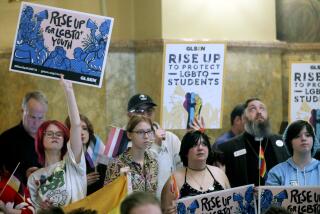Justices Reject School Condom Policy Challenge
WASHINGTON — The Supreme Court on Monday rejected a parental challenge to a school program that makes condoms available free to junior and senior high school students.
Some parents maintain that they should have a right to opt out of the program but the Massachusetts courts ruled that school officials, not dissenting parents, control what happens on campus. Without comment, the justices refused to hear an appeal filed on behalf of parents who argued that they have a right to control the moral upbringing of their children.
Separately, the justices also rejected the first smokers’ rights claim to come before them. They refused to hear the case of a Florida woman who was denied a job because of a city policy requiring job applicants to swear that they had not used tobacco products for one year.
The woman said that this policy discriminated against her without regard to her performance but the Florida courts said that employers may inquire about an applicant’s private habits to save on insurance costs.
In recent years, groups representing conservative and Christian parents have complained about public school programs that venture into controversial areas such as teenage pregnancy, drug abuse education and condom distribution.
But the outcome in Monday’s case suggests that the issue will be decided in battles before local school boards, rather than in the courts.
In the “condom availability” dispute, the Massachusetts Supreme Judicial Court had upheld the school policy on grounds that students are not compelled to participate.
In 1992, the Falmouth, Mass., schools began a voluntary program of distributing condoms to students from grades seven to 12. A condom could be obtained free from a school nurse or for 75 cents from a restroom vending machine.
Students were given pamphlets on AIDS and other sexually transmitted diseases.
School board members called the program an enlightened effort to prevent disease and teenage pregnancies but some parents said that the policy would only encourage sex among teenagers.
In a lawsuit, the parents said that they should be notified when their children request a condom and should have the right to say no. School officials said that this provision would render the program ineffective, and they noted that a majority of the community supported the policy.
In 1993, a New York appeals court struck down a similar policy in the New York City schools, but the Massachusetts courts upheld the Falmouth program.
“Although the program may offend the religious sensibilities of the plaintiffs, mere exposure at public schools to offensive programs does not amount to a violation [of their constitutional rights]. . . . The students are free to decline to participate in the program. Parents are free to instruct their children not to participate,” the state court said in upholding the policy.
Attorneys for the American Center for Law and Justice, acting on behalf of the parents, called this a “dangerous precedent” that would leave school officials free to “provide students with everything from cigarettes to syringes to soft porn to weapons instruction.”
But the justices dismissed the appeal in the case (Curtis vs. School Committee of Falmouth, 95-617).
In the smokers’ case, Arlene Kurtz, 52, said that she would agree not to smoke while on the job. She disagreed, however, with a policy that restricts smoking in private.
The city of North Miami said that it adopted its strict no-smoking policy for new hires in 1991, citing a study showing that it costs $4,611 per year more in health costs for smokers than for nonsmokers. The policy does not apply, however, to current employees who smoke.
In her appeal, Kurtz said that if employers can deny jobs based solely on private behavior, they can ask job applicants an array of personal questions, such as whether they engage in safe sex, drink beer on weekends, ride a motorcycle, go skiing or participate in other risky sports.
Three members of the court--Chief Justice William H. Rehnquist and Justices Antonin Scalia and Clarence Thomas--could not be hired in North Miami because they smoke. But without comment, the court refused to hear the appeal in the case.
In other action, the court:
* Dismissed an appeal filed by William G. Bonin, dubbed the “freeway killer” who faces execution for 14 murders in Los Angeles and Orange County (Bonin vs. Calderon, 95-6373). This clears the way for his execution within the next two months, state officials say.
* Refused to hear an appeal filed by heavyweight boxer Mike Tyson, who contends that he was convicted unfairly of rape (Tyson vs. Trigg, 94-2050). Harvard law professor Alan Dershowitz, representing Tyson, maintained that Indiana prosecutors are unfairly allowed to pick the judge who tries a case. But the state and federal courts rejected this claim and the justices refused to reconsider the rulings.
* Let stand without comment a federal appeals court ruling upholding restrictions on TV and radio stations that air steamy movies and racy talk shows (Pacifica Foundation vs. FCC, 95-509, and Action for Children’s Television vs. FCC, 95-520). By a 7-4 vote last June, the U.S. Circuit Court of Appeals for the District of Columbia had said that the Federal Communications Commission can require that any indecent program be aired between 10 p.m. and 6 a.m.
“We find that the government has a compelling interest in protecting children under the age of 18 from exposure to indecent broadcasts,” the appeals court said.
Past court rulings have defined “indecent” as that material describing in patently offensive terms sexual or excretory activities or organs.
More to Read
Sign up for Essential California
The most important California stories and recommendations in your inbox every morning.
You may occasionally receive promotional content from the Los Angeles Times.











